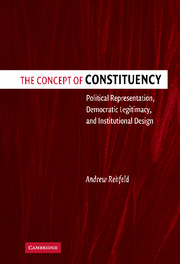 The Concept of Constituency
The Concept of Constituency Published online by Cambridge University Press: 27 July 2009
In the end, though, Mr. Clinton's success in twisting arms had little to do with the bill's economic merits [of granting permanent normal trade status to China]. He won over the undecided using a bit of Lyndon Johnson–style vote-buying – one congressman got a zip code for a small town, and two others got a natural gas pipeline near El Paso.
– David SangerLife in any large nation in the twenty-first century is, in most ways, different from life in the late eighteenth century. Yet the places people live still seem to define who they are, and constitute a seemingly “natural” way of organizing electoral constituencies. In the words of Tip O'Neill, former speaker of the U.S. House of Representatives, “All politics is local.” But, as I argued in Chapter 1, politics is local largely because territorially bound constituencies create incentives for politicians to deal with local issues in their compaigns. Put differently, if constituencies were defined by profession, then all politics would be vocational. The question remains whether, in the twenty-first century, we can justify defining extremely large electoral constituencies for representation in a national legislature by territory.
On the face of it, territory seems just as good or better than most constituency definitions. After all, physical proximity allows constituents to interact with each other and allows their representatives to have easy access to them.
To save this book to your Kindle, first ensure no-reply@cambridge.org is added to your Approved Personal Document E-mail List under your Personal Document Settings on the Manage Your Content and Devices page of your Amazon account. Then enter the ‘name’ part of your Kindle email address below. Find out more about saving to your Kindle.
Note you can select to save to either the @free.kindle.com or @kindle.com variations. ‘@free.kindle.com’ emails are free but can only be saved to your device when it is connected to wi-fi. ‘@kindle.com’ emails can be delivered even when you are not connected to wi-fi, but note that service fees apply.
Find out more about the Kindle Personal Document Service.
To save content items to your account, please confirm that you agree to abide by our usage policies. If this is the first time you use this feature, you will be asked to authorise Cambridge Core to connect with your account. Find out more about saving content to Dropbox.
To save content items to your account, please confirm that you agree to abide by our usage policies. If this is the first time you use this feature, you will be asked to authorise Cambridge Core to connect with your account. Find out more about saving content to Google Drive.